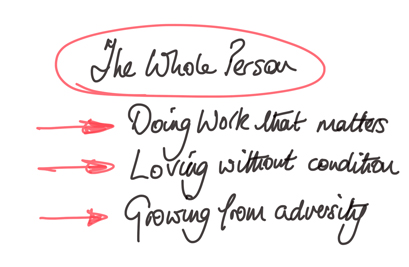The True Power of ‘Being’
There is so much discussion in the world today around the use and misuse of power – both in our workplaces and by the individuals we consider ‘leaders’ of our very own businesses, societies, and institutions, it should come as no surprise that our comprehension, acknowledgment and practice of the concept seems obviously and greatly lacking in its essence.
In our dictionaries, power is broadly defined as “a person or thing that possesses or exercises authority or influence”. This generally accepted definition suggests ‘power’ is more about ‘doing’ and when we engage in use of power; we’re utilising our authority to get at something or someone.
In this thought of line, and probably in line with our experiences, there seems to be many ways we perceive and arguably exercise power in our workplaces.
Coercive power is associated with those who are in an authoritative relationship with others. Connection power is associated with those who know some people considered influential. Expert power is associated with those who have expert knowledge on a given topic. Information power is associated with those who have access to information considered to be of certain importance. Legitimate power is perceived of a particular position one holds. Recognition or reward power is associated with people being consistently recognized for the results/ outcomes of their doing.
But what if power was more about ‘being’ rather than ‘doing’?
What if we defined power as “a skill allowing an individual to empower another with decisions” as we do in medicine or as “energy required to effectively drive change” as we do in physics? What if the concept of power was more about our ‘being’ than ‘doing’ in business; would our way of exercise evolve?
We, human beings, by the virtue of being a living organism, interpret and modify our agencies through our very own conception of ourselves. It is only when we are unaware of the fact that everyone is granted the same degree of power by birth, we start to develop a false belief /sense of isolation. We deeply fear the unknown inside of our being, lack emotional agility to navigate our ocean of ‘wholeness’ and deny ourselves the very use of our most precious latent powers.
“Afraid that our inner light will be extinguished or our inner darkness exposed, we hide our true identities from each other. In the process, we become separated from our own souls. We end up living divided lives, so far removed from the truth we hold within that we cannot know the “integrity that comes from being what you are”.”
-Parker Palmer
Every time we engage in an organisational transformation project, we take time to have deep discussions with higher executive(s) on their individual and collective abilities present and lacking; and it becomes quickly clear that it’s often the notion of self-separation, which creates misalignment between work and meaning, self and other, power and service, strategy and execution or product and customer.
We mistakenly equate wholeness to perfection; where in reality, “life’s beauty is inseparable from its fragility”.
Alain de Botton shared in his 2009 Ted Talk, most of us live our lives by definitions of others, completely disconnected from our true selves and inner wishes. “One of the interesting things about success is that we think we know what it means” he said, “A lot of the time our ideas about what it would mean to live successfully are not our own. They’re sucked in from other people. And we also suck in messages from everything from the television to advertising to marketing, etc.”
What does our self-perception have anything to do with power?
See.. When we are separated from our true selves, we start to grow an external perception on ourselves. We design and build a ‘persona’ of ourselves that may or may not have authentic elements of our true beings. Think of it as living in a body of a particular profile, a character self-grown. That character often has more than a few “well-recognized” qualities and because any recognition feeds our egos, we unconsciously and willingly nourish these “well-recognized” qualities to excess until they actually dominate and dictate us and everything/everyone else around. Further, to approve our very own self-creations, we tend to form narratives, stories, and start making choices according to patterns these personas exercise and along with our imagined experiences.
This is exactly why sometimes we look at a particular person or a leader and wonder how in the world they’re rationalising this or that behavior or a given decision… They seem completely ‘disconnected’ to us because they actually are… We all are disconnected from self from time to time and especially during certain life situations; some of us just stay there longer.
And so, because we often lack an understanding of our ‘whole’ being and we strive for perfection at the same time, we genuinely struggle to trust and make space for our imperfect sides, dark corners, unintentionally stripping ourselves away from inner capacity to make choices.
The results?
What we actually see in the real world: increased egocentricity and decreased empathy.
It is true. When we become disconnected from self, we eventually become disconnected from others.
In a 2006 study, for example, Adam Galinsky and colleagues of Northwestern University primed power or powerlessness in participants and asked them to draw a capital E on their forehead with a washable marker. Those who had thought about a time they had power over someone tended to draw an E on their forehead which was correct from their point of view, but appeared mirror reversed from the point of view of someone standing opposite them. One consequence of lack of empathy and egocentricity is that it inclines us to see people as a means to our ends – more as instruments of our own goals. In another study, Deborah Gruenfeld and colleagues at Stanford University also have found evidence that if we arouse power feelings in otherwise ordinary people, they begin to see others as objects.
What now?
Talking about language, we are proposing a different definition to power.
We are ALL granted power AND equally. It is without choice and discrimination. We do have a choice, however, as to how we want to work with that gift of power. We can choose to embrace it and grow authenticity or we can choose to deny our common ground and walk away.
A critical tip for those of us having the fortune to be placed in critical positions: We are much safer to eliminate pride from our proud circumstances. Those exceptional business leaders driving impact and profit, they commit to grow consciousness and work extra hard to stay as close to self as possible despite their prestigious circumstances. They do so in service of self-empowerment and organisational growth.

Our human minds are powerful tools. Our human bodies are powerful tools. Our human emotions are powerful tools. The way in which we choose to expose, direct and focus our wholistic selves becomes a determining factor as to what we are choosing to BE, which determines what we draw and receive from the infinite wisdom inside and around us.
The true power – power of ‘being’ is what determines the kind, the quality and the quantity of what we receive and offer back in life, which is a direct reflection of our choices.
Which Leadership Behaviors Drive Positive Employee Outcomes?

Leaders are a key element of any workplace: they playRead more…




Comments are closed.